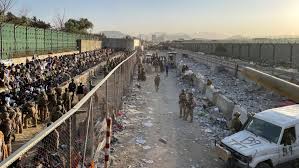Analyzing the Abbey Gate Bombing: A Tragic Event in Afghanistan

Introduction
The Abbey Gate bombing that occurred on August 26, 2021, during the chaotic withdrawal of U.S. troops from Afghanistan marks a crucial chapter in contemporary conflict history. This tragic event, which resulted in significant casualties, highlighted not only the perils faced by those on the ground but also the broader implications for international security and humanitarian efforts in crisis zones. Understanding the Abbey Gate bombing is essential for recognizing the dynamics of modern warfare and the protection of civilians.
The Event and Its Context
On the day of the attack, thousands of Afghans had gathered at Kabul’s Hamid Karzai International Airport, seeking evacuation from the Taliban’s resurgence following the U.S. withdrawal. The Abbey Gate served as a major entry point for those trying to escape the imminent fear of Taliban rule. Amid this turmoil, a suicide bomber detonated explosives, killing nearly 170 individuals, including 13 U.S. service members.
This suicide bombing marked one of the deadliest days for U.S. forces in Afghanistan since 2011 and led to international condemnation. The attack was claimed by ISIS-K, an offshoot of the Islamic State operating in Afghanistan, which has exploited the power vacuum created by the Taliban’s takeover.
Immediate Aftermath
The fallout of the Abbey Gate bombing was profound. It prompted a reevaluation of security protocols at the airport and raised urgent questions regarding the effectiveness of the evacuation efforts orchestrated by allied nations. In addition, it led to a retaliatory drone strike by the United States targeting what they described as militants responsible for plotting further attacks.
The bombing also spurred discussions in global political forums regarding the need for coordinated security measures in conflict zones and increased scrutiny on the effectiveness of prevailing military strategies. Moreover, it invigorated debates among policymakers regarding the U.S. exit strategy and its implications for regional stability.
Ongoing Significance
As the dust settles from the immediate crisis, the long-term implications of the Abbey Gate bombing continue to resonate. It has raised critical conversations about the future of Afghanistan under Taliban rule, the rise of extremist groups, and the responsibilities of foreign nations when handling humanitarian crises. Furthermore, the incident serves as a grim reminder of the complexities involved in military interventions and the collateral impacts on civilian lives.
Conclusion
The Abbey Gate bombing stands as a stark symbol of the unpredictability of conflict and the dire circumstances faced by those seeking safety in war-torn regions. As the international community reflects on this event, it underscores the importance of fostering global dialogue on security, humanitarian assistance, and ethical military engagement. Addressing the lessons learned from the Abbey Gate tragedy will be crucial in shaping future responses to similar crises and enhancing the safety of vulnerable populations.








